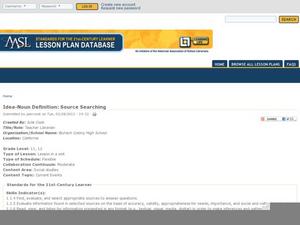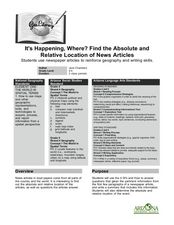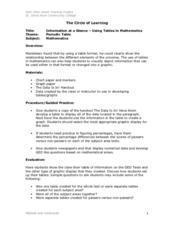Illustrative Mathematics
Global Positioning System II
Intricate details of a modern technology that many of us take for granted in our phones, computers (and some cars) are laid bare in a short but deeply investigative activity. The math behind a seemingly simple GPS device is...
Curated OER
Publishing a Newspaper about Biomes
Young journalists create newspapers of individual biomes after researching their biomes. This lesson can be completed in three phases and concludes with each person publishing their individual newspaper pages.
Kenan Fellows
Determining Stream Health by the Diversity and Types of Benthic Organisms
How diverse are the benthic organisms found in local streams? Using the information learned in previous lessons on identification of macroinvertebrates and on calculating stream index values, groups determine the health of local streams....
Curated OER
Idea-Noun Definition: Source Searching
A great idea for showing language arts pupils the universality of themes, even in the real world! Have class members choose an idea-noun (peace, justice, war, love, etc.) at the beginning of the year or semester. They complete weekly...
Teach Engineering
Weather Basics
Weather — there's more to it than meets the eye of the storm. With this resource young meteorologists learn about the basics of weather, including information about the factors that influence the weather, common weather vocabulary, and...
Alabama Department of Archives and History
La Mobile: A Case Study of Exploration and Settlement
The Le Moyne brothers, Jean-Baptiste and Pierre, were among the first explorers of the Gulf Coast. Class members read biographical information and journal entries about these men, study maps showing where the settlements they established...
Curated OER
Transition Words in Expository Writing
Create to learn! Your class can create posters of transitional words and phrases to help them compose an explanatory text. They work in groups and focus on one type of transition (time, place, importance, etc.). They also create a poster...
Curated OER
Recipe for Sensational Sentences
'Cook-up' sensational sentences with your class. They expand sentences by adding more descriptive words. Then discuss the importance of using appropriate grade level language in daily speaking and writing.
TV411
Avoid Mushy Writing: Be Specific
Replacing, bland, inexact generalizations with specific statement and precise information is the focus of a worksheet that models how to transform general statements into specific ones. After examining four models, learners have an...
WindWise Education
Are Birds Impacted by Small Wind Turbines?
How do we know if the wind turbine at our school is impacting birds? Here, small groups work together and conduct field work in order to determine the impact of a human-made structure on birds. The groups also determine their searcher...
Curated OER
How Can We Locate Specific Places On Earth?
Second graders discover how to use longitude and latitude to locate specific sites on Earth. They compare old and new ways of locating specific places, and discover how latitude and longitude coordinates are used to locate places on Earth.
Curated OER
It's Happening, Where? Find the Absolute and Relative Location of News Articles
Young scholars read newspaper articles. In this social studies activity, students locate the latitude and longitude of the location where the news article takes place. Young scholars write a summary of the news article.
Curated OER
Locating, Organizing, And Using Information
Students develop a topic to conduct research. They formulate questions about it and use a graphic organizer for categorizing information. Students use the information to generate a thesis to narrow the focus of the paper. They write a...
Curated OER
Put Me in My Place: Using Alphanumeric Grids to Locate Places
Students practice locating points on a large wall grid and create and label a neighborhood map. In this geography lesson, students spell and discuss places as the teacher places them on the map. They discuss the concept of an...
Curated OER
Location, Location, Location
Students investigate the properties of triangles. In this geometry instructional activity, students identify the location of different polygons. They identify the different properties of triangles and polygons.
Curated OER
Locating Vent Fields Using CTD Data
Students describe the way hydrothermal vents work. Students work on locating vent regions through remote collection of data about water temperature and density. Comparing density and temperatures graphs, students search for indicators...
Curated OER
Information at a Glance - Using Tables in Mathematics
High schoolers create table to display GED Testing data located in paragraph provided by teacher, use information in table to create appropriate graph, and determine percentage difference between passing scores and failing scores.
Curated OER
Using Logos and Mission Statements to Communicate Sustainable Forestry Information
Young scholars survey forestry foundations to see how they represent important information into their logos and mission statements. In this forestry lesson plan, students use the information to better understand visual representations...
Curated OER
Locating Points Using Cartesian Coordinates
Students discover coordinates as they explore Chicago. In this math lesson plan, students give the coordinates of a point, plot a point, and use the coordinate system in locating places on a map.
Curated OER
Lesson Two: Use Various Sources to Locate Names of People Who Embody Various Attributes
Sixth graders research a person who has made a difference. In this research lesson plan, 6th graders create a list of people that they would be interested in researching. They choose one and gather information about that person to put on...
Curated OER
Language Arts: Gathering the Appropriate Information
High schoolers are able to use the library and/or computer lab to research reliable information sources supporting arguments being put forward in the position paper. They are able to find examples of mission statements from various...
Curated OER
Language Arts: Reading for Information
Sixth graders discover how to turn book titles into questions in order to locate the information during their reading. Using t-charts, they list titles and subtitles with the questions they suggest. Gradually, 6th graders progress from...
Curated OER
Animal Story: An Informational Narrative
Students use the computer to research information and publish creative narrative stories about the life of a specific Everglades animal. This lesson uses many educational, computer programs including the iLife suite, publishing...
Curated OER
Informational Questioning
Pupils practice writing basic questions to gain information. Working as a class, they identify questions they would ask to gain information about locations, time, and events. After writing their questions, they practice asking and...

























